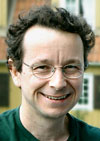Peter Agre and Roderick MacKinnon have won the Nobel Prize in Chemistry for 2003 for discoveries concerning channels in cell membranes.
 Agre, from Johns Hopkins University School of Medicine, Baltimore, USA, is credited with the discovery of water channels and Roderick MacKinnon, from the Howard Hughes Medical Institute, The Rockefeller University, New York, USA, with the structural and mechanistic studies of ion channels.
Agre, from Johns Hopkins University School of Medicine, Baltimore, USA, is credited with the discovery of water channels and Roderick MacKinnon, from the Howard Hughes Medical Institute, The Rockefeller University, New York, USA, with the structural and mechanistic studies of ion channels.
According to the Royal Swedish Academy of Sciences, this year's prize illustrates how contemporary biochemistry reaches down to the atomic level in its quest to understand the fundamental processes of life. It rewards two scientists whose discoveries have clarified how salts (ions) and water are transported out of and into the cells of the body.
The discoveries have afforded us a fundamental molecular understanding of how, for example, the kidneys recover water from primary urine and how the electrical signals in our nerve cells are generated and propagated. This is of great importance for our understanding of many diseases of e.g. the kidneys, heart, muscles and nervous system.
That the body's cells must contain specific channels for transporting water was suspected as early as the middle of the nineteenth century. However, it was not until 1988 that Peter Agre succeeded in isolating a membrane protein that, a year or so later, he realised must be the long-sought-after water channel.
This decisive discovery opened the door to a whole series of biochemical, physiological and genetic studies of water channels in bacteria, plants and mammals. Today, researchers can follow in detail a water molecule on its way through the cell membrane and understand why only water, not other small molecules or ions, can pass.

The other type of membrane channel, which is the subject of this year's Prize, is the ion channel. Roderick MacKinnon surprised the whole research community when in 1998 he was able to determine the spatial structure of a potassium channel. Thanks to this contribution we can now "see" ions flowing through channels that can be opened and closed by different cellular signals.
The ion channels are important for, among other things, the function of the nervous system and the muscles. What is called the action potential of nerve cells is generated when an ion channel on the surface of a nerve cell is opened by a chemical signal sent from an adjacent nerve cell, whereupon an electrical pulse is propagated along the surface of the nerve cell through the opening and closing of further ion channels in the course of a few milliseconds.
Peter Agre (54) was born in Northfield, Minnesota. The American earned a medical degree from the Johns Hopkins University School of Medicine, Baltimore, in 1974. He is a professor of Biological Chemistry and professor of Medicine at the Johns Hopkins University School of Medicine.
Roderick MacKinnon (47) is from Burlington (near Boston). The American graduated in medicine in 1982 from the Tufts Medical School, Boston. He is a professor of Molecular Neurobiology and Biophysics at The Rockefeller University in New York.
EXTERNAL LINK:
The Royal Swedish Academy of Sciences






 © 2025
© 2025